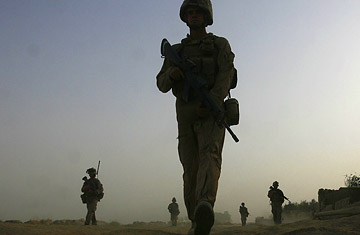
U.S. Marines patrol the town of Garmser, Afghanistan
The first movement came before dawn: villagers filed out of their homes and a few hundred armed attackers took up positions in people's parlors and bedrooms. At about 4:30 a.m. in the town of Want, which is part of Nooristan province in eastern Afghanistan, the attackers, believed to be Taliban, let fly their rounds and rocket-propelled grenades in four directions at the International Security Assistance Force (ISAF) Command Outpost, surprising coalition soldiers and their Afghan National Army counterparts stationed there. U.S. and Afghan government forces returned fire, but the mud brick walls of the village houses absorbed the impact of incoming bullets, and the Taliban kept the barrage coming, breaching the outer security ring and fighting hard until noon. The Americans called in mortars and close air support; Apache attack helicopters and fixed-wing aircraft responded with fire from the sky. The Taliban were finally driven back, reportedly suffering more than 40 casualties. But nine American soldiers also lost their lives.
The loss of American life, among the worst single incidents since the Afghan war began at the end of 2001, stunned U.S. military and media observers. But it was little cause for sympathy among Afghans. With people hungry and out of work, the ISAF is a natural scapegoat. The popular consensus is that the situation in Afghanistan is getting worse, not better, and that the coalition is to blame. Most Afghans waver between believing the ISAF is working against the country's interest and believing that there are just not enough coalition troops to get the job done. And most Afghans have a hard time believing that the ISAF can't control rising prices for food and fuel. They've seen or heard of laser-guided missiles falling from American warplanes with mythical precision, taking out Taliban caches while schoolrooms or hospitals immediately adjacent stood unscathed. And so, as popular Afghan logic goes, the only conceivable reason the ISAF hasn't swept the Taliban from the country is that it doesn't want to. Some of the most conspiratorial argue that the U.S. wants instability in Afghanistan so it can continue to have an excuse to base troops in the country — and to use it as a base to launch an attack on Iran.
The capital is increasingly the scene of Taliban attacks — and attendant frustration, even among the part of the populace that welcomes the stability brought by the NATO coalition. Says Ahmad Javed, 33, a shopkeeper: "I used to go to market at least once a week to buy goods for my shop, but now I hardly go to market because I am so much afraid of the suicide bombing. When I go out, I am not sure whether I return alive or not." The week before in Kabul, a taxi driver named Aimal Naheb was stuck in traffic when an explosion lifted his car and blackened the air with dust. Only when the dust cleared and Aimal saw flames coming from the Ministry of the Interior just 15 cars in front of him did he realize he wasn't the target. Fearful of a secondary explosion, Aimal turned across traffic and drove away as fast as he could. The people fated to die were dead already, and he'd be of little help to the rest. An hour later, waiting for a client at a hotel across the street from the Iranian embassy, he says he saw a car get too close to an armored ISAF convoy and take fire from the roof-mounted turrets. "If you go behind car of ISAF, they shoot you and you're dead," says Aimal. "This is my country! This is shame for us."
If there is any doubt about whether the Nooristan attack was staged by the Taliban, it's because it is an area where Gulbuddin Hekmatyar holds some sway. Hekmatyar is one of the most ruthless warlords in Afghanistan's history, though he received financial support from the U.S. during the war with the Soviets. The government of Hamid Karzai has offered Hekmatyar a controversial olive branch in recent months. However, Tamim Nooristani, the ex-governor of the province, told TIME that Hekmatyar's men took part in the attack along with Pakistani and Afghan Taliban.
It is the Taliban who appear to be growing stronger and whose attacks are believed to be shedding more coalition blood. Yet the ISAF contends that the Taliban are in no position to overturn the status quo. "There's no way that they'll ever get back into power here," says Royal Navy Captain Mike Finney, the ISAF's spokesman, who contends that the coalition's mission is expanding and that it is doing more in more places; if they're taking more casualties, they're inflicting more as well. "The Taliban knows they'll never take this country back," Finney says. "They're just doing what they can to undermine the governance here, maybe it's out of jealousy. There's no way that ISAF forces will ever withdraw."
Finney insists that "the insurgents have taken a lot of hits, particularly at the high level ... We've put out several news releases about high-level commanders who have been dealt with, and that affects them. They haven't got an endless supply." He then belittled the Taliban: "They're just trying to chip away. [It's like] teasing your big sister. And they're just out to make life bloody difficult." — With reporting by Ali Safi / Kabul
